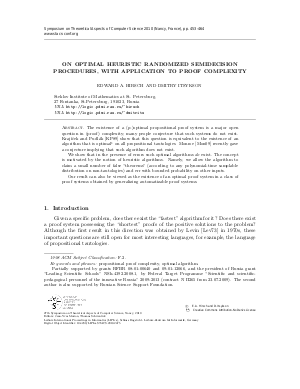On Optimal Heuristic Randomized Semidecision Procedures, with Application to Proof Complexity
Authors Edward A. Hirsch, Dmitry Itsykson
-
Part of:
Volume:
27th International Symposium on Theoretical Aspects of Computer Science (STACS 2010)
Part of: Series: Leibniz International Proceedings in Informatics (LIPIcs)
Part of: Conference: Symposium on Theoretical Aspects of Computer Science (STACS) - License:
 Creative Commons Attribution-NoDerivs 3.0 Unported license
Creative Commons Attribution-NoDerivs 3.0 Unported license
- Publication Date: 2010-03-09
File

PDF
LIPIcs.STACS.2010.2475.pdf
- Filesize: 287 kB
- 12 pages
Document Identifiers
Subject Classification
Keywords
- Propositional proof complexity
- optimal algorithm
Metrics
- Access Statistics
-
Total Accesses (updated on a weekly basis)
0Document
0Metadata
Abstract
The existence of a ($p$-)optimal propositional proof system is a major open question in (proof) complexity; many people conjecture that such systems do not exist. Kraj\'{\i}\v{c}ek and Pudl\'{a}k \cite{KP} show that this question is equivalent to the existence of an algorithm that is optimal\footnote{Recent papers \cite{Monroe}
call such algorithms \emph{$p$-optimal} while traditionally Levin's algorithm was called \emph{optimal}. We follow the older tradition. Also there is some mess in terminology here, thus please see formal definitions in Sect.~\ref{sec:prelim} below.} on all propositional tautologies. Monroe \cite{Monroe} recently gave a conjecture implying that such algorithm does not exist.
We show that in the presence of errors such optimal algorithms \emph{do} exist. The concept is motivated by the notion of heuristic algorithms. Namely, we allow the algorithm to claim a small number of false ``theorems'' (according to any polynomial-time samplable distribution on non-tautologies) and err with bounded probability on other inputs.
Our result can also be viewed as the existence of an optimal proof system in a class of proof systems obtained by generalizing automatizable proof systems.
Cite As Get BibTex
Edward A. Hirsch and Dmitry Itsykson. On Optimal Heuristic Randomized Semidecision Procedures, with Application to Proof Complexity. In 27th International Symposium on Theoretical Aspects of Computer Science. Leibniz International Proceedings in Informatics (LIPIcs), Volume 5, pp. 453-464, Schloss Dagstuhl – Leibniz-Zentrum für Informatik (2010)
https://doi.org/10.4230/LIPIcs.STACS.2010.2475
BibTex
@InProceedings{hirsch_et_al:LIPIcs.STACS.2010.2475,
author = {Hirsch, Edward A. and Itsykson, Dmitry},
title = {{On Optimal Heuristic Randomized Semidecision Procedures, with Application to Proof Complexity}},
booktitle = {27th International Symposium on Theoretical Aspects of Computer Science},
pages = {453--464},
series = {Leibniz International Proceedings in Informatics (LIPIcs)},
ISBN = {978-3-939897-16-3},
ISSN = {1868-8969},
year = {2010},
volume = {5},
editor = {Marion, Jean-Yves and Schwentick, Thomas},
publisher = {Schloss Dagstuhl -- Leibniz-Zentrum f{\"u}r Informatik},
address = {Dagstuhl, Germany},
URL = {https://drops.dagstuhl.de/entities/document/10.4230/LIPIcs.STACS.2010.2475},
URN = {urn:nbn:de:0030-drops-24753},
doi = {10.4230/LIPIcs.STACS.2010.2475},
annote = {Keywords: Propositional proof complexity, optimal algorithm}
}
